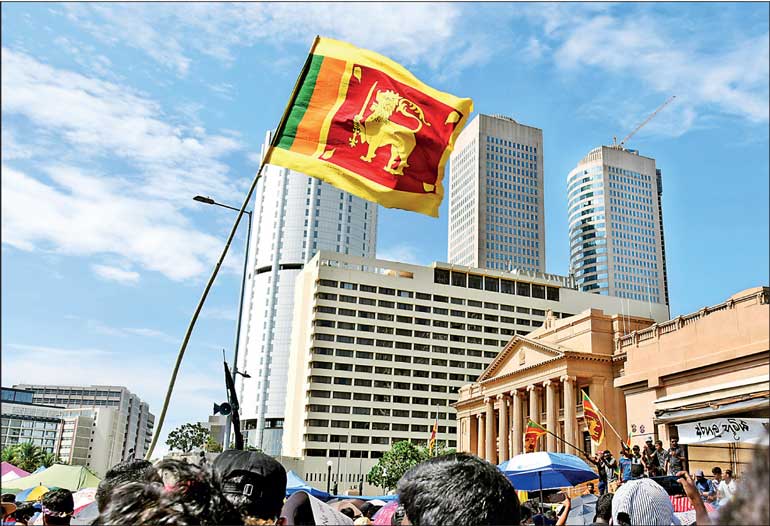Monday Feb 16, 2026
Monday Feb 16, 2026
Saturday, 23 April 2022 00:05 - - {{hitsCtrl.values.hits}}

Their lives reduced to a battle for survival, the Sri Lankans are awakening to the fact that for seven decades the country has been continually mismanaged; drop by drop every hope has disappeared- Pic by Ruwan Walpola
 “Nothing is more powerful than an idea, whose time has come” – Victor Hugo (1802-1885)
“Nothing is more powerful than an idea, whose time has come” – Victor Hugo (1802-1885)
Rarely has this nation been this united in one battle cry – “Go, Gota, Go!”
From the north to the south, east to the west, a long suffering people, angry, bitter and helpless, are on the march.
With the prices of their essential provisions going up hour to hour virtually, the Sri Lankan rupee now earning the dubious honour of being the poorest performing currency in the world (for a nation often fed on tales of their country’s various international achievements, perhaps some grim pleasure could be derived from even such an appalling collapse of value!) the cry is reaching a desperate crescendo. It is true they live in a poor and troubled Third World country, but never have they reached these low depths.
Everything has doubled in price. Even if the householder manages to get some food to the kitchen, how will it be cooked? There is no gas to cook their food with, at busy junctions we see lengthy lines of people with empty gas cylinders, waiting, tired and resigned. Stalled vehicles of every description form mile-long queues near service stations, waiting for fuel. Realising that it will be many hours before the fuel arrives, some drivers leaving their vehicles in the queue have left to attend to other matters. There is no electricity, many things are not working, and services have come to a halt.
‘April is the cruellest month,’ wrote T.S. Eliot; it certainly is the hottest in our besieged land. To escape the unbearable heat and humidity of April some used to go to the cooler hill country. For others, the only relief is an electric fan, keeping the hot air out. Alas, this April there is no escape! The little fuel left in the car must be preserved for emergency travel, so no going to the hills. For the fans to run there must be electricity, the daily power cuts are long and erratic. In order to get some relief from the horrendous heat, we are compelled to open our windows, only to be besieged by vicious mosquitoes.
So incendiary is the burning anger of the men and women now demonstrating at the Galle Face Green that no politician even remotely associated with the status quo will dare show his face there. Ignoring the scorching sun and the pouring rain, the people vent their frustration, helpless owners of a land, sucked dry. Their disillusionment is total, their hearts filled with an all-consuming rage against the entire structure; the pompous, self-satisfied and corrupt thing we have been calling our ‘leadership’ for seven long decades
However little they understand the full extent of the crisis, however incoherent their thoughts, the adults can still relate to their plight. For the little children there is no comprehension, everything has changed in their innocent lives; there is no television, no studies, no food being cooked, no going out, the refrigerator is empty, in many a home the breadwinner has lost his job; confused, the children cry; their world has become hot, dark, and frightening.
Influenced by its history, beliefs and social impulses, every nation evolves its own leadership culture. Very symbolic of how our leaders view themselves, as well as how the system wishes to portray them, are the convoys of vehicles that transport our leaders here and there.
As the convoy nears a given location, the traffic police scramble feverishly to stop all other vehicles, even the pedestrians. First comes fast moving police motorcycles with a pillion rider waving his hands frantically, followed soon after by plush limousines and Defender type vehicles (European built) moving at tremendous speed. Sometimes the convoy is followed by an ambulance, in case the leader requires urgent medical attention. In a few seconds the convoy is gone, the people watch its fast disappearing tail with gaping mouths, struggling to define the meaning of the spectacle they had just witnessed. Did our leaders move with such speed and purpose, only to bring this country to the situation it is now placed?
Was the people’s mandate, a word thrown about today with offhand disingenuousness, to create this living hell?
It is accepted that the best and the purest form of democracy is direct voting, when those concerned vote on all matters that affect them. Due to practical reasons such direct voting, like what happens at a referendum, is not always possible, hence representative democracy. The entire nation cannot be voting on every matter, on a day-to-day basis. Instead, we send our representatives to the Parliament to decide and manage on our behalf, for a given period of time. Even in a small organisation, an association or a club, the members appoint a committee to manage its affairs on their behalf.
Politicians and political parties canvass our vote on the basis of a set of promises, commonly called election manifestos. Admittedly, in our complex reality, not all promises can be kept. Equally, a government is not limited to its manifesto; while governing, many unforeseen or new situations could come up, requiring different responses, even a change of direction. A pacifist government, could be forced into war by an aggressive neighbour. A socialist oriented government could be pushed towards privatisation by sheer economic necessity. As reasonable people, we understand that no government can stick to a given script, regardless of circumstances.
However, in a democracy, it cannot be argued that an electoral mandate is a blanket authority or a fixed term tenure, come what may. If an elected government takes a path diametrically opposite to what it promised to do, or, if during its governance the civil life of its people collapses drastically, the government must leave or obtain a new mandate. Not doing so, is to take the position that the people gave a mandate for a particular purpose and at the same time a mandate to do the exact opposite! To say that a people gave a mandate to diminish their own living standards, or heap unbearable burdens on them, defies logic.
Their lives reduced to a battle for survival, the Sri Lankans are awakening to the fact that for seven decades the country has been continually mismanaged; drop by drop every hope has disappeared. While they go from blunder to blunder, the leaders have seized every opportunity to enrich themselves, many of them (or their families) have obtained citizenship in other countries, or have stashed their wealth in foreign lands.
In the name of democracy, our leaders have enacted a grotesque drama, completely devoid of the spirit of democracy. Sri Lankans not only have been duped, their future too has been taken away from them.
This realisation is perhaps what makes the ongoing struggle so different. Although the focus is on Gotabaya Rajapaksa the much over-rated President; the cry is against the entire power structure, Government as well as Opposition, the co-authors of seven decades of abuse. If Gotabaya is a man hoisted far beyond his capacity, so were all the other Presidents we have had. After nearly every presidency, we heard strident calls to do away with the office of the presidency; such was the incompetence, abuse and the bungling of all the incumbents.
So incendiary is the burning anger of the men and women now demonstrating at the Galle Face Green that no politician even remotely associated with the status quo will dare show his face there. Ignoring the scorching sun and the pouring rain, the people vent their frustration, helpless owners of a land, sucked dry. Their disillusionment is total, their hearts filled with an all-consuming rage against the entire structure; the pompous, self-satisfied and corrupt thing we have been calling our ‘leadership’ for seven long decades.
Like dead men discussing their funeral arrangements, these leaders are now pontificating in Parliament and other forums on the way out for the nation!
Among the brilliant men drawn to Communist movement in the tumultuous decades of 1930s and 40s was the Hungarian Jew Arthur Koester (1905-1983), outstanding thinker and writer. Idealistic and brave, these young men gave their all to the “cause”, searching for a new “God” to put right the many wrongs of the world. They were fearful times; the Communist parties of Europe were in a fight to the death against the rising Nazi movement. As if this was not forbidding enough, within the movement were vicious ideological clashes, accompanied by the remorseless Stalinist purges.
Inside the conspiratorial Communist parties, in their hothouse environment, the young idealist found something very different to what they were looking for; a political movement pervaded by monolithic intolerance, ideological bigotry and cynicism.
Deeply disillusioned, they rebelled. ‘The God that Failed’ is a collection of essays written by some of these disenchanted former fellow travellers of a movement, found to be rotten within. The authors are well known, celebrated writers and thinkers; Andre Gide, Arthur Koestler, Ignazio Silone, Richard Wright, Louise Fischer and Stephen Spencer. Arthur Koestler’s essay on his days in the Communist Party of Germany is particularly gripping, ending with a poignant biblical reference.
“I served the communist party for seven years – the same length of time as Jacob tended Laban’s sheep to win Rachel, his daughter. When the time was up the bride was led into his dark tent; only the next morning did he discover that his ardours had been spent not on lovely Rachel but on the ugly Leah.
I wonder whether he ever recovered from the shock of having slept with an illusion. I wonder whether afterwards he believed that he had ever believed in it. I wonder whether the happy end of the legend will be repeated; for at the price of another seven years of labour, Jacob was given Rachel too, and the illusion became flesh.
And the seven years seemed unto him but a few days, for the love he had for her.”
For seven long decades our nation too had embraced an illusion. In 1948 we adopted a parliamentary system with the hope that this country will develop into a stable prosperous nation, a mini England; with comparable systems, strong institutions, effective services, all held together by high personal standards. This did not happen, those who took over the leadership had a very different concept of public life, mimicking something understood only imperfectly. Instead, every government and every leader took us lower, notch by notch. At the time it was not obvious. Now we can see it clearly.
Today, without electricity, cooking gas, fuel, food and most crucially, without the dollars to pay for them, the illusion has finally died in the people’s hearts.
What will come next is difficult to predict. Whether this nation has it in them the capacity for a national resurrection is to be seen. Such an undertaking will test its mettle as never before; the road ahead is long and hard.
Never has Victor Hugo’s proposition – “Nothing is more powerful than an idea whose time has come” rung with such urgency for this nation.